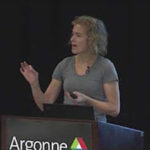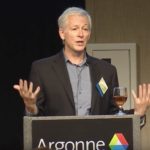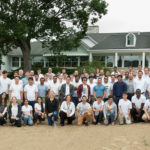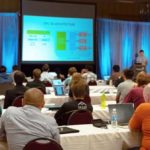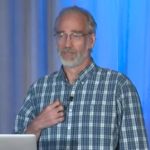Cleve Moler from MathWorks gave this talk at the 2017 Argonne Training Program on Extreme-Scale Computing. “MATLAB is a high-performance language for technical computing. It integrates computation, visualization, and programming in an easy-to-use environment where problems and solutions are expressed in familiar mathematical notation. Typical uses include: Data analysis, exploration, and visualization.”
Video: Silicon Photonics for Extreme Computing
Keren Bergman from Columbia University gave this talk at the 2017 Argonne Training Program on Extreme-Scale Computing. “Exaflop machines would represent a thousand-fold improvement over the current standard, the petaflop machines that first came on line in 2008. But while exaflop computers already appear on funders’ technology roadmaps, making the exaflop leap on the short timescales of those roadmaps constitutes a formidable challenge.”
Video: Revolution in Computer and Data-enabled Science and Engineering
Ed Seidel from the University of Illinois gave this talk at the 2017 Argonne Training Program on Extreme-Scale Computing. The theme of his talk centers around the need for interdisciplinary research. “Interdisciplinary research (IDR) is a mode of research by teams or individuals that integrates information, data, techniques, tools, perspectives, concepts, and/or theories from two or more disciplines or bodies of specialized knowledge to advance fundamental understanding or to solve problems whose solutions are beyond the scope of a single discipline or area of research practice.”
Future HPC Leaders Gather at Argonne Training Program on Extreme-Scale Computing
Over at ALCF, Andrea Manning writes that the recent Argonne Training Program on Extreme-Scale Computing brought together HPC practitioners from around the world. “You can’t get this material out of a textbook,” said Eric Nielsen, a research scientist at NASA’s Langley Research Center. Added Johann Dahm of IBM Research, “I haven’t had this material presented to me in this sort of way ever.”
Dr. Marius Stan Presents: Uncertainty of Thermodynamic Data – Humans and Machines
Marius Stan from Argonne gave this talk at the 2017 Argonne Training Program on Extreme-Scale Computing. Famous for his part-time acting role on the Breaking Bad TV show, Marius Stan is a physicist and a chemist interested in non-equilibrium thermodynamics, heterogeneity, and multi-scale computational science for energy applications. The goal of his research is to discover or design materials, structures, and device architectures for nuclear energy and energy storage.
A Vision for Exascale: Simulation, Data and Learning
Rick Stevens gave this talk at the recent ATPESC training program. “The ATPESC program provides intensive, two weeks of training on the key skills, approaches, and tools to design, implement, and execute computational science and engineering applications on current high-end computing systems and the leadership-class computing systems of the future. As a bridge to that future, this two-week program fills the gap that exists in the training computational scientists typically receive through formal education or other shorter courses.”
Registration Open for Argonne Training Program on Extreme-Scale Computing
“As a bridge to that future, this two-week program fills many gaps that exist in the training computational scientists typically receive through formal education or shorter courses. The 2017 ATPESC program will be held at a new location from previous years, at the Q Center, one of the largest conference facilities in the Midwest, located just outside Chicago.”
TotalView: Debugging from Desktop to Supercomputer
Peter Thompson from Rogue Wave Software presented this talk at the Argonne Training Program on Extreme-Scale Computing. “Purpose-built for applications using hundreds or thousands of cores, TotalView for HPC provides a set of tools that give scientific and academic developers unprecedented control over processes and thread execution, along with deep visibility into program states and data. By allowing the simultaneous debugging of many processes and threads in a single window, you get complete control over program execution: running, stepping, and halting line-by-line through code within a single thread or within arbitrary groups of processes or threads.”
Jack Dongarra Presents: Adaptive Linear Solvers and Eigensolvers
Jack Dongarra presented this talk at the Argonne Training Program on Extreme-Scale Computing. “ATPESC provides intensive, two weeks of training on the key skills, approaches, and tools to design, implement, and execute computational science and engineering applications on current high-end computing systems and the leadership-class computing systems of the future.”
Video: Introduction to Parallel Supercomputing
Pete Beckman presented this talk at the Argonne Training Program on Extreme-Scale Computing. “Here is the Parallel Platform Paradox: The average time required to implement a moderate-sized application on a parallel computer architecture is equivalent to the half-life of the latest parallel supercomputer.”


